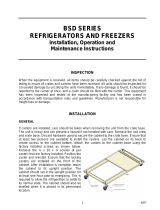PROBLEM POSSIBLE CAUSE REMEDY
1. Condensing unit fails to start - no
hum.
2. Condensing unit fails to start -
hums, but trips on overload
protector.
3. Condensing unit starts, but fails
to switch off of “start” winding.
4. Condensing unit starts and runs,
but short cycles on overload
protector.
5. Condensing unit runs but short
cycles on...
6. Condensing unit operates for
prolonged periods or
continuously.
14
1. Line disconnect switch open.
2. Fuse removed or blown.
3. Overload protector tripped.
4. Control stuck in open position.
5. Wiring improper or loose.
1. Improperly wired.
2. Low voltage to unit.
3. Starting capacitor defective.
4. Relay failing to close.
5. Compressor motor has a winding
open or shorted.
6. Internal mechanical trouble in
compressor.
1. Improperly wired.
2. Low voltage to unit.
3. Relay failing to open.
4. Run capacitor defective.
5. Excessively high discharge
pressure.
6. Compressor motor has a winding
open or shorted.
7. Internal mechanical trouble in
compressor.
1. Additional current passing through
overload protector.
2. Low voltage to unit (or
unbalanced if three phase.)
3. Overload protector defective.
4. Run capacitor defective.
5. Excessive discharge pressure.
6. Suction pressure too high.
7. Compressor too hot - return gas.
8. Compressor motor has a winding
shorted.
1. Overload protector.
2. Thermostat.
3. High pressure cut-out due to:
a. Insufficient air or water supply.
b. Overcharge.
c. Air in system.
4. Low pressure cut-out due to:
a. Liquid line solenoid leaking.
b. Compressor valve leak.
c. Undercharge.
d. Restriction in expansion
device.
1. Shortage of refrigerant.
2. Control contacts stuck or frozen
closed.
3. Excessive heat load placed into
cabinet.
4. Prolonged or too frequent door
openings.
5. Evaporator coil iced.
6. Restriction in refrigeration
system.
7. Dirty condenser.
8. Filter dirty.
1. Close start or disconnect switch.
2. Replace fuse.
3. Determine reason and
correct/replace control.
4. Repair or replace control.
5. Check wiring against diagram.
1. Check wiring against diagram.
2. Determine reason and correct.
3. Determine reason and replace.
4. Determine reason and
correct/replace if necessary.
5. Replace compressor.
6. Replace compressor.
1. Check wiring against diagram.
2. Determine reason and correct.
3. Determine reason and
correct/replace if necessary.
4. Determine reason and replace.
5. Check discharge shut-off valve,
possible overcharge, or
insufficient cooling on condenser.
6. Replace compressor.
7. Replace compressor.
1. Check wiring diagram. Check for
added fan motors, pumps, etc. con-
nected to wrong side of protector.
2. Determine reason and correct.
3. Check current , replace protector.
4. Determine reason and replace.
5. Check ventilation, restrictions in
cooling medium, restrictions in
refrigeration system.
6. For salad models, temperature
control differential set to close-
increase differential.
7. Check refrigerant charge (fix leak)
add if necessary.
8. Replace compressor.
1. See (4) above.
2. Differential set too close - widen.
3.
a. Check air or water supply to
condenser-correct.
b. Reduce refrigerant charge.
c. Purge.
4.
a. Replace.
b. Replace.
c. Fix leak, add refrigerant.
d. Replace device.
1. Fix leak, add charge.
2. Clean contacts or replace control.
3. Allow unit sufficient time for
removal of latent heat.
4. Plan or organize schedule to
correct condition.
5. Defrost.
6. Determine location and remove.
7. Clean condenser.
8. Clean or replace.
TROUBLESHOOTING & SERVICING REFRIGERATION SYSTEM




















